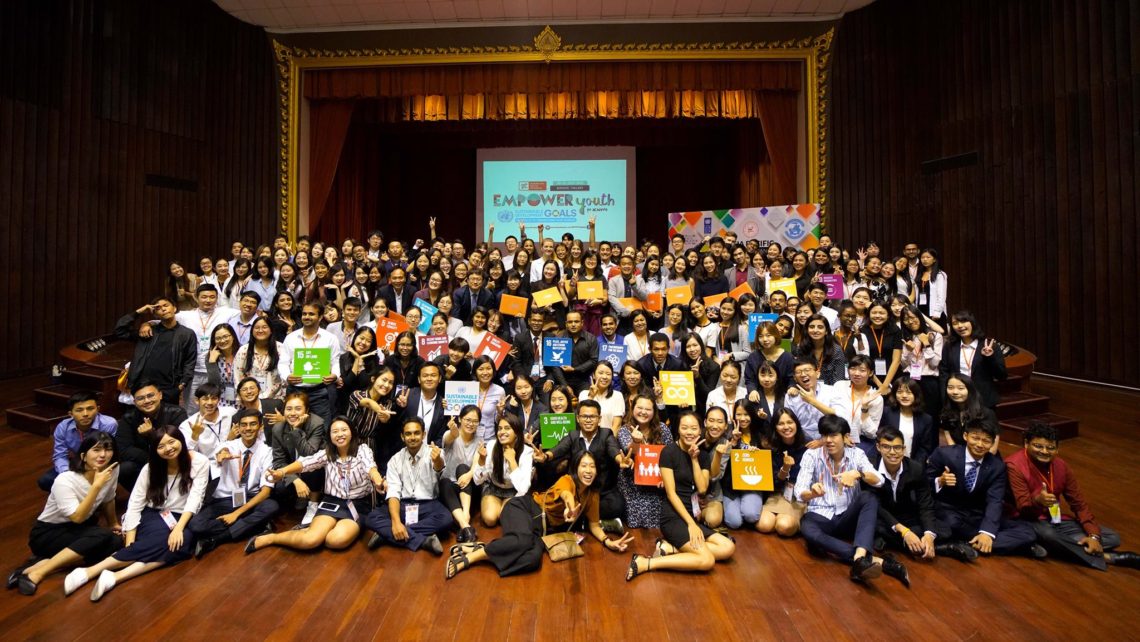Context: The 2030 Agenda for Sustainable Development is the largest global partnership agreement and development plan in history. In September 2015, it was agreed upon by all United Nations Member States and consists of 17 Sustainable Development Goals (SDGs) and 169 targets. The SDGs aspire to improve global living standards across the world by 2030. Established in January 2017, the Asia Pacific Youth Exchange (APYE) Thailand is a two-week programme that aims to empower youth by engaging them in SDG initiatives. Youth delegates are given a unique opportunity to learn and hone the necessary skills in order to participate meaningfully in SDG activities.
Implementation of programme/ initiative: The APYE programme is currently being implemented in four countries, namely the Republic of Korea, the Philippines, Thailand and Viet Nam, with more than 2,000 APYE alumni from over 50 countries and territories. Throughout 18 APYE editions, more than 200 youth-led social projects have been introduced aimed at achieving the SDGs.
APYE Thailand is hosted by the Urban Youth Academy, the United Nations Development Programme (UNDP) and the local social enterprise GlobalACT Co., ltd. It is actively supported by the Economic Commission for Asia and the Pacific (ESCAP). APYE Thailand is connected with 17 communities and their local governments, other United Nations agencies, as well as other international organizations and corporate partners. The main objective is to empower youth to actively achieve the SDGs by partaking in formative experiences that develop diverse skills and establish networks that can support their future growth.
Main challenges: The main obstacles that arise in implementing projects stem from cultural gaps due to the diversity of nationality, educational background, age, work and personal experience amongst delegates. Moreover, a lack of team cohesion sometimes has a negative impact on a programme’s overall output and delegate satisfaction. Cultural differences also exist between youth delegates and local populations, which can bring about challenges.
To address the aforementioned challenges, delegates are organized and grouped based on SDGs preference, professional background and nationality, in order to promote mutual respect, common understanding and appreciation of different perspectives. APYE Thailand is aware that, the more informed delegates are of local communities, the more likely their projects are to respond effectively to community needs; establishing effective agendas and strong relationships between delegates and community leaders is therefore essential to successful delivery of interventions.
Results achieved: APYE Thailand has been held successfully, facilitating experiential learning for delegates and making progress in terms of inclusive, social and sustainable development for local communities. Through forming deeper partnerships with different organizations, the programme has had a significant impact on leaders within the Asia-Pacific region. APYE Thailand has successfully launched 143 social projects in alignment with the SDGs and in support of inclusive and sustainable development. A total of 931 youth alumni and 115 youth volunteers have participated in projects spanning 17 local communities across Thailand. Over 40 national and international partnerships have been formed as a result of the co-creation process between international youth and local communities and based on the principle of leaving no one behind.
Moving Forward: In aiming to empower a new generation of community leaders and social entrepreneurs, APYE Thailand will continue to promote youth development, analyse the local social context of new communities and maintain commitment to making transformational impacts within those communities. APYE Thailand endeavours to mobilize resources and devise new solutions to existing problems by capitalizing on the creative potential the youth possess. APYE Thailand will continue to engender grassroots community engagement and cross-learning initiatives to extend and strengthen civil society as a whole. The model sets out the fundamental characteristics required to achieve these objectives in line with a social entrepreneurial mindset.
Replicability: The success of APYE Thailand has depended on replicating three main components, which other initiatives can endeavour to emulate:
- Leadership development training to enhance knowledge and build skills.
- Local immersion to engage youth in social entrepreneurship projects.
- A youth symposium to showcase the innovations developed to address the existing challenges faced in communities.
APYE Thailand also highlights the benefits of immersion into a local community. The approach the programme takes is having delegates spend seven days in a local community, where they are able to undertake various SDGs-focused research activities, as well as gain key insight and skills applicable to creating a viable social business model.
References:
https://www.apyethailand.org
Project Details
Date: October 9, 2019
